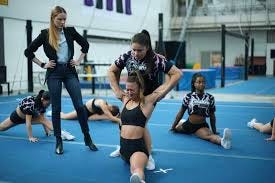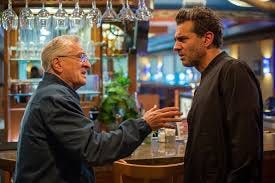Backspot, the feature directorial debut from D.W. Waterson, may be set in the world of competitive cheerleading but it is a million miles removed from the comparatively frothy likes of Bring It On and its extended array of direct-to-video follow ups. The focus here is on Riley (Devery Jacobs), a driven high school cheer squad member who is determined to succeed at the physically punishing sport and takes things out on herself (particularly her eyebrows) when she feels she has failed to live up to her high standards. Before long, she and her teammate/girlfriend Amanda (Kudakwashe Rutendo) are recruited to join the Thunderhawks, an elite cheer team coached by the fiercely competitive Eileen (Evan Rachel Wood) and her determination to impress her new coach finds her pushing herself to new extremes in order to succeed. Inevitably, this begins to play havoc with her relationship with Amanda—who enjoys cheer squad but not enough to willingly risk potential harm—and her own psyche, which runs the risk of crumbling any time she perceives herself as being less than 100% perfect.
As films involving talented young people pushing themselves to physical and emotional extremes under the tutelage of an equally driven and determined coach/mentor/antagonist go, Backspot certainly beats the overrated Whiplash by a mile, mostly thanks to the stirring and memorable performance by Devery (one of the stars of Reservation Dogs) and the welcome supporting turn by Wood as her coach, a woman who comes across as a stern and uncrossable taskmaster in the gym but who is just an ordinary woman eating cold Chinese food in her car outside of it. I also liked the relationship between Riley and Amanda and the way that it develops over the course of the film. The problem is that while Waterson’s film (which was written by Joanne Sarazen from a story by Waterson) has a lot of good individual scenes and some welcome moments of humor, the narrative doesn’t really go anywhere after a while and the final scenes demonstrate a singular lack of imagination as they try to wrap everything up in a disappointingly tidy bow. Watching it, I couldn’t help but think of The Novice, a powerful 2021 film that told a similar story—one set in the world of collegiate competitive rowing featuring a spectacular performance from Isabelle Fuhrman—that did not devolve into cliches as it went on. Backspot certainly makes the case for the sheer athleticism and endurance required to make it in the world of competitive cheering—it just doesn’t quite make it as a compelling film.
Ezra, the new film from actor-turned-director Tony Goldwyn, is a project that is so obviously good in its intentions that you can almost forget, if only for a little while, what a tacky and borderline tasteless bag of goods it is. The film stars Bobby Cannavale as Max, a struggling comedian whose life is a mess as he tries to negotiate his career with co-parenting his autistic son, Ezra (William A Fitzgerald) with Jenna (Rose Byrne), the estranged wife that he clearly wants to get back with, even if she has moved on to a Ralph Bellamy-style lawyer (Goldwyn). When Ezra begins acting out in class in increasingly dangerous ways, the suggestion is made that he should go to a special school and begin an aggressive medication, two avenues that Max angrily rails against to the point where he winds up jailed and slapped with a restraining order. Unwilling to give up on his son, Max kinda sorta steals him away in the middle of the night for a road trip that eventually finds them heading to Los Angeles for Max to make a career-making appearance on Jimmy Kimmel (who, perhaps recognizing that he is little more than a plot gimmick, wants him on the show but won’t fly him in) with Jenna and his own father (Robert De Niro), a man with regrets over how he raised his son, in vague pursuit.
Ezra is a film that clearly has its heart in the right place throughout but also spends most of that time with its foot in its mouth and its head way up someplace else. Every once in a while, there are moments in Tony Spiridakis’s screenplay (said to be inspired in part by his own interactions with his son) that strike nice notes of authenticity and which suggest the ways in which this movie might have gone to become something genuinely meaningful and valuable. Alas, these moments are surrounded by a screenplay that seems more focused on following the established Rain Man playbook, right down to the road trip conceit (which was a bit dubious even back in 1988), and fitting in appearances from familiar faces (besides those mentioned, the likes of Vera Farmiga, Rainn Wilson and Whoopi Goldberg also turn up) than in trying to come to grips with the challenges that all parents face when rearing their children, special needs or no. Perhaps the biggest problem is that Max is, to put it charitably, kind of a jerk and even though he may ultimately mean well, it is difficult to work up much of any rooting interest in him, his relationships with his son, father and ex or if he will arrive in time for his big break—based on the sheer abrasiveness of Cannavale’s performance, most viewers will find themselves rooting for Jenna and the authorities to get Ezra away from him throughout and will find the final reel attempts to make him into something heroic to be a little gross. Between its cliched construct and willingness to use autism as little more than a plot device, Ezra is an ultimately cloddish mess that has been made with the best of intentions, I suppose, but which leads viewers on a one-way trip to movie Hell.





